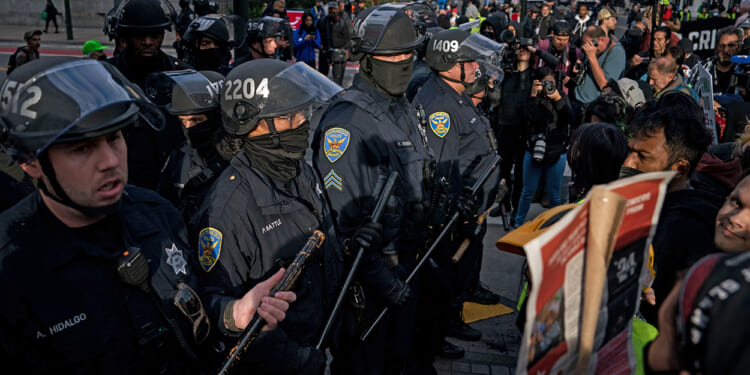Although Super Tuesday may have been predictable on the presidential front, the big primary day held some surprises lower down the ballot. Deep-blue cities and states are rejecting leftist policies.
In San Francisco, voters backed ballot measures to strengthen the city’s police force and mandate drug tests for welfare recipients, prompting the San Francisco Chronicle to declare on its front page Wednesday morning: “Progressivism Is Out … ”
Voters also placed many moderates on the Democratic County Central Committee, which the Chronicle reported “could reshape who is elected in San Francisco for years.”
Steven Buss, co-founder of the nonpartisan organization GrowSF, said of progressive politicians: “They had their turn. They failed. Now it’s time for the city to move on.”
Ballot Measure E bolsters the San Francisco Police Department by creating new policies for officers “to report use-of-force incidents,” allows police to use drones and set up security cameras to reduce and prevent crime, and authorizes police to use “new surveillance technology” with a board of supervisors’ approval.
The approved ballot measure also reduces the amount of time police officers spend on paperwork, “with the goal that patrol officers spend no more than 20% of their work time on administrative tasks.” The proposal was approved with just shy of 60% of the vote.
The most controversial of the ballot measures approved Tuesday was Measure F, which requires drug screening for welfare recipients. The policy requires single adults under 65 and with no dependents to submit to drug tests before being eligible to receive county welfare assistance.
“When screening indicates a recipient may be dependent on illegal drugs, the city will provide a professional evaluation and may refer the recipient to an appropriate treatment program,” the ballot measure states.
The program would be paid for almost entirely with money that current welfare recipients are ineligible for, either due to illegal drug use or due to a refusal to submit to drug testing. City Controller Ben Rosenfield estimated that the program would cost between $500,000 and $1.4 million annually.
“These costs would be offset by estimated annual savings of between $100,000 and $2 million from recipients who are no longer eligible to receive aid, with any additional savings available for treatment and other services for other program recipients,” Rosenfield explained.
Measure F was approved with 63% of the vote.
Other measures approved by San Francisco voters include Measure G, which is aimed at improving education standards and math curricula, and Measure D, which cracks down on bribery and “quid pro quo” arrangements among city officials and employees, stiffens penalties for officials and employees who do not meet the new standards, and requires annual ethics courses for officials and employees.
Measure G was approved with nearly 84% of the vote, Measure D was approved with 88%.
The deep-blue state of Washington also approved ballot initiatives Tuesday that are aimed at undoing left-wing policies and legislation enacted over the past few years.
Initiative 2081 established a “parents’ bill of rights,” which allows parents to review books in school libraries and remove books deemed sexually explicit; allows parents to opt their children out of sex education courses or class sessions or assignments related to sex, gender ideology, politics, or religion; and pledges that students’ and families’ religious beliefs will be respected, among other items.
Initiative 2113 reversed Democrat-backed restrictions on police pursuits, which have increased the number of suspects evading or escaping police. One suspect called 911 to cite the progressive legislation and tell the police to stop chasing him. The new policy allows police pursuit when an officer has a “reasonable suspicion” that an individual has broken the law and “poses a threat to the safety of others.”
Initiative 2111 ended state and local income tax.
All three initiatives were approved by the state Legislature, while three others were not addressed by the Legislature and will appear on the state’s ballots in November. None of the three citizen-led measures approved by the Legislature requires the governor’s signature to become law.
Oregon also recently moved to undo disastrous progressive policies.
Last week, Oregon legislators passed HB 4002, recriminalizing drugs three years after making fentanyl, cocaine, heroin, and methamphetamine legal.
The prior policy, adopted in 2020 with nearly 60% support from voters, imposed minor fines on those convicted of possessing illegal drugs. The legislation passed last week moves possession of drugs from a Class E violation—punishable by a maximum of a $100 fine—to a Class C misdemeanor, punishable by up to a month in jail and fines of up to $1,250.
Additionally, in the face of the worsening illegal immigration crisis and correlating increase in violent crime, self-declared “sanctuary cities” are now backing away from the label.
The most visible example is New York City’s Mayor Eric Adams. a Democrat, who has called for changes to the Big Apple’s immigration policy, encouraging local authorities to cooperate with U.S. Immigration and Customs Enforcement.
Originally published by The Washington Stand
Have an opinion about this article? To sound off, please email letters@DailySignal.com and we’ll consider publishing your edited remarks in our regular “We Hear You” feature. Remember to include the URL or headline of the article plus your name and town and/or state.












